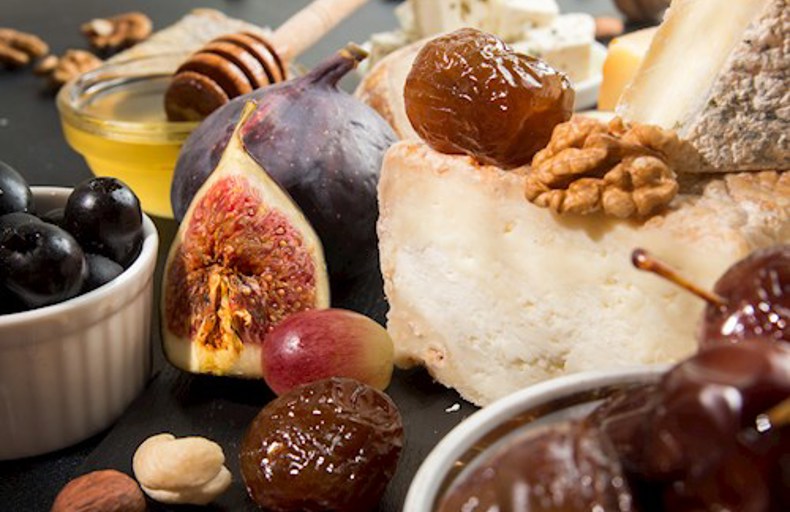Your Final 10 Nights for Gaza – Automate your charity in the blessed last 10 nights of Ramadan.
Schedule your donationsYour Final 10 Nights for Gaza – Automate your charity in the blessed last 10 nights of Ramadan.
Schedule your donationsYour Final 10 Nights for Gaza – Automate your charity in the blessed last 10 nights of Ramadan.
Schedule your donationsYour Final 10 Nights for Gaza – Automate your charity in the blessed last 10 nights of Ramadan.
Schedule your donations10th May 2019
Being health conscious and taking care of your body externally and internally is an act of faith. Our religion teaches us our bodies are an amanah (trust) given to us by God and how we treat them will eventually lead to questioning on the Day of Judgement. The Qur'an and Sunnah has highlighted some foods that contain great virtue. We have compiled a list below to help you excel in Ramadan by incorporating these super foods into your diet inshaAllah.

1. Olives
"A blessed Tree, an Olive, neither of the east nor of the west, whose oil is well-nigh luminous..." [Surah 24:35]
"Eat the olive oil and massage it on your hair and skin, for it comes from a blessed tree." [Tirmidhi]
Amidst the long hours of keeping our fasts, weakness and tiredness are common factors one may experience. For this reason, consuming olives are of high benefit. Eating olives has a positive effect on maintaining healthy blood, as they boost iron levels, keeping our energy levels consistent. Olives also allow our immune system function better, as well as having a positive effect on our cognitive development.
2. Dates
"There is a tree among the trees which is similar to a Muslim (in goodness). Its leaves do not fall. What is that tree? The Prophet (saw) himself said, "That is the date palm tree".
Eating dates benefits our diet greatly. Dates are rich in vitamins and protein and lowers cholesterol. Eating dates during iftar and suhoor therefore, help equip the body with these nutrients that will help maintain the fast. Additionally, dates are rich in iron, thus help prevent being fatigued or experiencing light-headedness and dizziness during the day. Overall, eating dates helps greatly with digestion. After a long day of fasting, with the sudden emergence of food into our system, consuming dates will help take our food in with much more ease.
3. Figs
“Eat figs! If I would say a certain type of fruit was sent down to us from the heavens I would say it was the fig because it has no seeds. It ends piles and is useful for rheumatism.” (Abu Darda RA)
Figs have a good source of various vitamins, minerals, antioxidants and fibre. They are most popularly used to prevent constipation and improve the digestive system. Figs also help improve the heart’s health, preventing heart diseases in the long run through its omega-3 and omega-6 fatty acids. These benefits will help greatly, specifically for the stomach during Ramadan!
4. Pumpkin
“The Holy Prophet (PBUH) amongst all other foods, liked pumpkin.” [Tirmidhi]
Pumpkins are full of health benefits that can shape towards maintaining our fasts with ease. Consuming pumpkin helps towards maintaining a healthy heart as well as preventing cancer with its large amount of antioxidants and cancer-protective properties. Pumpkins also help to lower blood pressure and improve sleep, helping you to relax and unwind after long fasts.
5. Honey
“Honey is a remedy for every illness and the Qur’an is a remedy for all illness of the mind, therefore I recommend to you both remedies, the Qur’an and honey." (Bukhari)
Honey has anti-bacterial and anti-fungal properties, beneficial for wounds or poor skin conditions. Honey strengthens the immune system and regulates blood sugar levels. Ulcers and other gastrointestinal disorders can be reduced with the use of honey, as well as the risk of certain cancers and heart diseases. Consuming honey regularly thus can have immense benefits when maintaining our fasts.
6. Cucumbers
Abdullah bin Ja'far said:
"The Prophet (PBUH) used to eat Qith'tha (wild cucumbers) with ripe dates." [At-Tirmidhi].
Cucumbers are made up of about 95% water. This makes them great to eat on hot summer days to help keep hydrated.
Cucumbers are also high in antioxidants and beneficial plant compounds that can help protect the brain, fight against certain cancers and may have anti-inflammatory properties. The greatest benefit of cucumbers in Ramadan are they aide in having fresh breath.
7. Barley
Aisha (RA) said: “When a member of the family of the Messenger of Allah (PBUH) would fall sick, he would order that barley soup is made and then the ill person would be commanded to have some of it. He used to say, ‘It strengthens the heart of the sad person and relieves the heart of the ill person, just as one of you would wash the dirt off her face with water’.” [Ibn Majah]
Barley is extremely healthy and nutrient dense. It is loaded with vitamins and minerals, is a rich source of antioxidants and has a high fibre content. Though it has loads of health benefits, it is most well known for lowering the risk of heart disease and diabetes.
8. Watermelon
It is narrated in Abu Dawood and At-Tirmidhi that the Prophet (PBUH) used to eat watermelon with ripe dates, saying:
"The hotness of this substance (dates) neutralises the coolness of that (watermelon)." In Ramadan post iftar watermelons are extremely satisfying, alhamdullilah.
Stay on top of eating these Sunnah foods and enjoy a healthy, energy-filled Ramadan!
May Allah allow us to eat healthy and take care of our bodies in the best of ways and take benefit from the Quran and Sunnah in all facets of healing and substance they provide ameen.